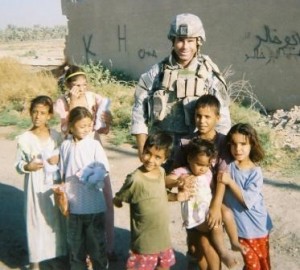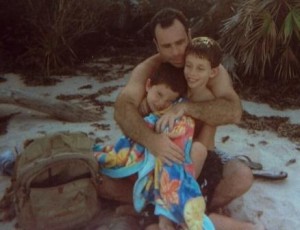Saturday
Featured StoriesAs Simple as Tea and Bread
By Sgt. Paul Kendel
This is an excerpt from a book SSG. Paul Kendel is writing, called Walking the Tiger’s Path:
A Soldier’s Spiritual Journey in Iraq.
Many of my fellow soldiers in Iraq often found my attitude and actions a bit inexplicable, particularly my interest in inviting myself into random Iraqi homes and asking the families to make tea and bread for me. This may sound peculiar, but I was never really scared when I was around the local people with whom we interacted on a daily basis.
The majority of Arabs I’ve met throughout my travels have been kind and helpful. I didn’t see my service in Iraq as a patriotic effort to expunge terrorism. I felt a loyalty toward those I served with, and I had something to prove to myself, that after seventeen years in the military I could acquit myself honorably in real war. I also looked at my deployment as an opportunity to visit the cradle of civilization.
I had looked forward to meeting the local people. I wanted the experience, but I would be considered an “idiot” who lacked “common sense” because I didn’t have a blanket fear and hatred. Other soldiers considered me suspicious and somewhat untrustworthy because I didn’t see the same “reality” they did. Maybe I was a little too trusting at times, but it was a fair tradeoff to having a universal mistrust and ignorance of the people, who, at least in theory, relied on us for their protection.
Often the whole family would come out. Sometimes I would ask for tea, or chai, but usually people in the house would offer it to me. Hosting American soldiers seemed a big occasion for them. And honestly for me, I found the intimate interaction with Iraqis a truly rewarding experience. It opened a window into a completely different world, one which very few soldiers serving in Iraq ever chose to see.
We’d set up at Observation Post 1 (OP1) occasionally just for something to do, and it was safer there than driving around, but sitting around OP1 was boring duty, hence we had time to explore the run down neighborhood filled with displaced, squatting Iraqi families.
Not long after our arrival, we set off to inspect a nearby building. The family occupying the dilapidated former military structure came out to greet us and the father invited us into their yard. When I asked for tea, he responded enthusiastically and invited us into his home. Being my sometimes overly trusting self, I walked straight in, leaned my weapon against the wall, took off my vest and sat down, making myself right at home.
My friends, including Cpl. Gibbs and Pvt. Ross, hesitated removing their gear. For most soldiers, this kind of friendly, informal, social encounter with local Iraqis was unusual. We usually spoke with Iraqis only about security matters, something that affected American forces in our sector. Most soldiers wanted nothing to do with the locals for various reasons, the most obvious one being that they didn’t trust them. Our job was to patrol our sector and stay alive.
This particular family – a young father and mother and their two year old daughter – welcomed us warmly. While the mother prepared tea, I attempted a conversation with the father who spoke little English, but smiles and hand gestures can say a lot. When I asked them if they were Sunni or Shiite, the father replied with little pride in his voice that they were Sunni. The Sunnis held a privileged status under Saddam. Not anymore. Many were now just squatters living in the remnants of the Saddam years. I gave the father a little money before I left. The mother held her young daughter, a beautiful child with big brown eyes and dark hair that fell to her shoulders. As I was leaving the Mother asked, “Toys?”“No,” I said. “But I will try to return soon with something.”
The issue of potable water was important and the father asked if we had any water to give them. Fortunately I was able to return the following day and make good on my promise. On this second visit we drove up to the house. The family seemed shocked that I’d returned so soon. The Iraqis are used to the Americans making pledges to them about security, medical supplies, water, and such, and not following through on their claims. I handed them two crates of water bottles and a big box full of candy, toiletries, and school supplies. And yes, I even brought a small Barbie doll for the little girl. When I held out the doll, she reached for it eagerly. The entire family responded with big smiles and genuine looks of gratitude. I left feeling good – it was a far more pleasurable to help the Iraqis than shoot at them.
____________________________________
Editor’s Note: This excerpt was selected because of its similarity to recent events in Iraq during “The Surge.” Thomas E. Ricks, Senior Military Correspondent to the Pentagon for the Washington Post, and author of The Gamble, has said that one aspect of the surge that was successful was the change in strategy toward the Iraqi people — listening to the Iraqis talk about their grievances. Ricks wrote, “The American forces’ most effective tactic didn’t involve firepower but instead, walking and talking… [the soldier interviewing the Iraqis was ordered to] sit down, take off his helmet and sunglasses, accept any drink offered, and speak respectfully.” As this anecdote shows, Sgt. Kendel was doing this through his own inspiration back in 2005.
____________________________________
SSG. Paul Kendel, a soldier with the 48th Infantry Brigade of the Georgia National Guard was deployed to Iraq in 2005. He had been in Baghdad only a short time before he felt besieged with doubts regarding the U.S. presence in that region — he saw little progress in ‘winning the hearts and minds’ of the Iraqi people as he witnessed the hardships the military placed on their way of life. Disillusioned with the aggression overwhelming some of the members of his military unit and inspired by Sakyong Mipham’s book Turning the Mind Into an Ally, he sent an email to Shambhala International, who connected him with Margot Neuman of the Ratna Peace Initiative (formerly Ratna Prison Initiative.) They corresponded throughout his deployment, and upon his return home, he deepened his involvement in the Shambhala Community through programs with the Sakyong, President Reoch and Pema Chodron, as well as attendance at several week-thuns. A number of his emails from Iraq were published in The Dot.
His military unit is currently in Afghanistan, though Sgt. Kendel was not deployed with the unit because of a previous injury exacerbated by his Iraq tour. He is retiring from the Guard next summer, and is completing his military active duty stateside, working at the “Wounded Warrior Project,” a veterans organization in Jacksonville, Florida where he resides.
SSG. Paul Kendel has a masters degree in Middle East history, and a second MA in anthropology. After completing his active tour of duty, he will return to teaching.



















Mar 18, 2012
Reply
Dear Paul Kendel,
Unfortunately I was not able to find your email address, but perhaps this message can be sent on to Paul Kendel. I would like to let you know that I read your book Walking the Tiger’s Path, and I was inspired to mail you. Reading your book was like reading a dharma book. I was impressed by the way you tried to be human under the most difficult and challenging circumstances, and I was glad to read that you have such a strong connection to the dharma and the teachers and people who helped you along the way. I wish you all the very best, and want to thank you once again for writing such a heartfelt honest book about your experiences.
Kind regards and all the very best in the dharma,
Dagmare Houniet (a member of the Amsterdam sangha in the Netherlands)